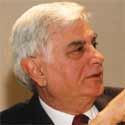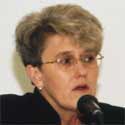Summer 2000
2000 Batten Awards and Symposium
Did the Media Do the Right Thing?
Has the primary coverage been useful to voters?
Moderator Lance Morrow questioned Bill Kovach, Curator of The Nieman Foundation; Mary Jo Meisner, Vice Chair, Community Newspaper Co.; Sam Fleming, News Director, WBUR-FM; and Yvonne Abraham, Boston Globe reporter. Some highlights:

Kovach: In terms of citizen information about the candidates, this primary process probably was as informative as any I can remember. But, it was largely the result of decisions made by the political parties and the candidates rather than decisions made by the journalists. The idea to have a range of debates…gave viewers and listeners as good a look at the candidates as I can remember…
My concern is…that this pressure to compete on almost an entertainment format, to try to grab readers, has forced newspaper journalists to always have to construct a narrative, to start the season with a story that’s going to be compelling and hold the readers through the campaign.
It’s almost like giving a child a loaded gun. The power of narrative, not properly handled, can be destructive…If you look at the story line that was developed early on the campaign – on the two princes in search of the next generation of their ownership of American politics – it has warped the coverage of George W. Bush and Al Gore.
The line on Al Gore, that he can’t tell the truth, has become acceptable common wisdom. But if you go back and look at the stories, it’s based on very thin gruel. I mean, even high school kids in New Hampshire recognize the difference between what Al Gore said and what the New York Times and the Washington Post reported.
The Love Canal story was so warped in the reporting because it fit the story line, that here’s the man, Pinocchio, who can’t tell the truth. That worries me more than almost anything else about the trend in coverage now.

Fleming: The debates were actually one of the better things, ironically, provided by the political parties. It meant our listeners had a chance to listen to these candidates unfiltered, up to a dozen times. It was a great service.
Overall, I think WBUR listeners between early January and March 10 would have gotten a good sense of the presidential candidates, even if the coverage was weighted and tilted towards your basic “Here they come and here they go.” I do think there were areas that we should have done better:
Business coverage. I think the real story in this country right now is the business world, e-business, the stock market, the job market, and I don’t think it nearly gets the attention that it deserves inside the political process.
Young voters. This group isn’t listening to the radio, isn’t reading newspapers…and are probably on the Internet every day. Who are they going to vote for and why?
People not making it in the economy. We hear every day about how great the economy is and then we read, in the fifth graph of many stories, that for a large section of the workforce wages have actually declined over the last 20 years. What do those people think?
And the role of new immigrants in this country is a huge issue that probably hasn’t been looked at nearly as thoroughly as it should. All of these issues relate to civic journalism.

Abraham: I was covering John McCain and it was not a normal campaign. The McCain campaign was kind of a cause. I agree that you do get caught in this bizarre world where you don’t know what day it is and you don’t know what city you’re in. The way you would get out of that cycle would be to talk to as many voters as possible, to glean more of their concerns…
But with McCain, it was as if the people showing up for what seemed like millions of town hall meetings were conspiring with the spinners and the candidate himself to just thwart any discussion of issues… I remember listening to WBUR’s series about New Hampshire voters. I just feel like I didn’t run into that many of those kinds of voters because, time and again, with McCain it just came down to character.

Meisner: This was the first time I lived in New England for the New Hampshire primary. What I was experiencing, not as somebody who’s covering the campaign or even directing the coverage of it… was this McCain phenomenon. I love the fact that he was out there at those town hall meetings. I had a much better idea of voters and of residents.
I think the message that we should learn from this… he represented to me the fact that the voters do want to really penetrate our system.
What [should] publishers and editors do?…We are really going to have to radically change the way that we cover presidential politics. Just as in the last several years we have really grappled with the issues in the industry of our credibility.
People don’t listen to us as much anymore. They really don’t care. I think the Internet is where they’re going. They’re going to all sorts of different ways to communicate and to express their viewpoints.
It’s going to take one of the key newspaper companies to really throw everything up in the air and come up with some new ways of doing things.
